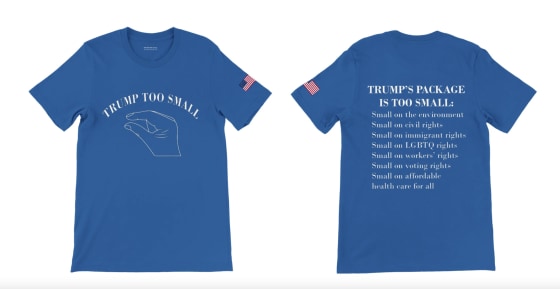
The Supreme Court on Thursday rebuffed a California lawyer's attempt to trademark the phrase "Trump too small," a reference to a crude joke made about former President Donald Trump.
The court ruled unanimously in favor of the U.S. Patent and Trademark Office over its decision to reject the application brought by Steve Elster, NBC News reported. In doing so the court tossed out a U.S. Court of Appeals for the Federal Circuit ruling.
The “Trump too small” phrase is a reference to a 2016 Republican presidential primary debate featuring Trump and Sen. Marco Rubio, R-Fla. Rubio joked about what he said were Trump’s small hands, adding: “And you know what they say about guys with small hands.”
Elster, an employment lawyer and progressive activist, applied to register “Trump too small” — a double-entendre meant to insinuate a correspondingly small penis — with the trademark office in 2018. The slogan appears on the front of a T-shirt Elster created, with “Trump’s package is too small” on the back.
The Hurricane season is on. Our meteorologists are ready. Sign up for the NBC 6 Weather newsletter to get the latest forecast in your inbox.

Elster said in his application that he wanted to spread a message that “some features of President Trump and his policies are diminutive.”
But the trademark office rejected his application on the grounds that members of the public would immediately associate the word “Trump” with the then-president. Under established law, Trump’s written consent would be required, the office concluded.
U.S. & World
Elster argued that his free speech rights would be violated if he could not register a trademark that criticizes a public figure. The appeals court ruled for him, saying his free speech rights under the Constitution’s First Amendment were violated.
The Biden administration, representing the trademark office, then appealed to the high court.
The case is the latest of several the Supreme Court has taken up recently concerning free speech rights in the trademark context.
In 2017, the court struck down a prohibition on trademarks that feature disparaging language, handing a win to an Asian American rock band called The Slants. Two years later, the court threw out a ban on trademarks based on immoral or scandalous words, ruling in favor of the clothing brand FUCT.
This story first appeared on NBCNews.com. More from NBC News:



